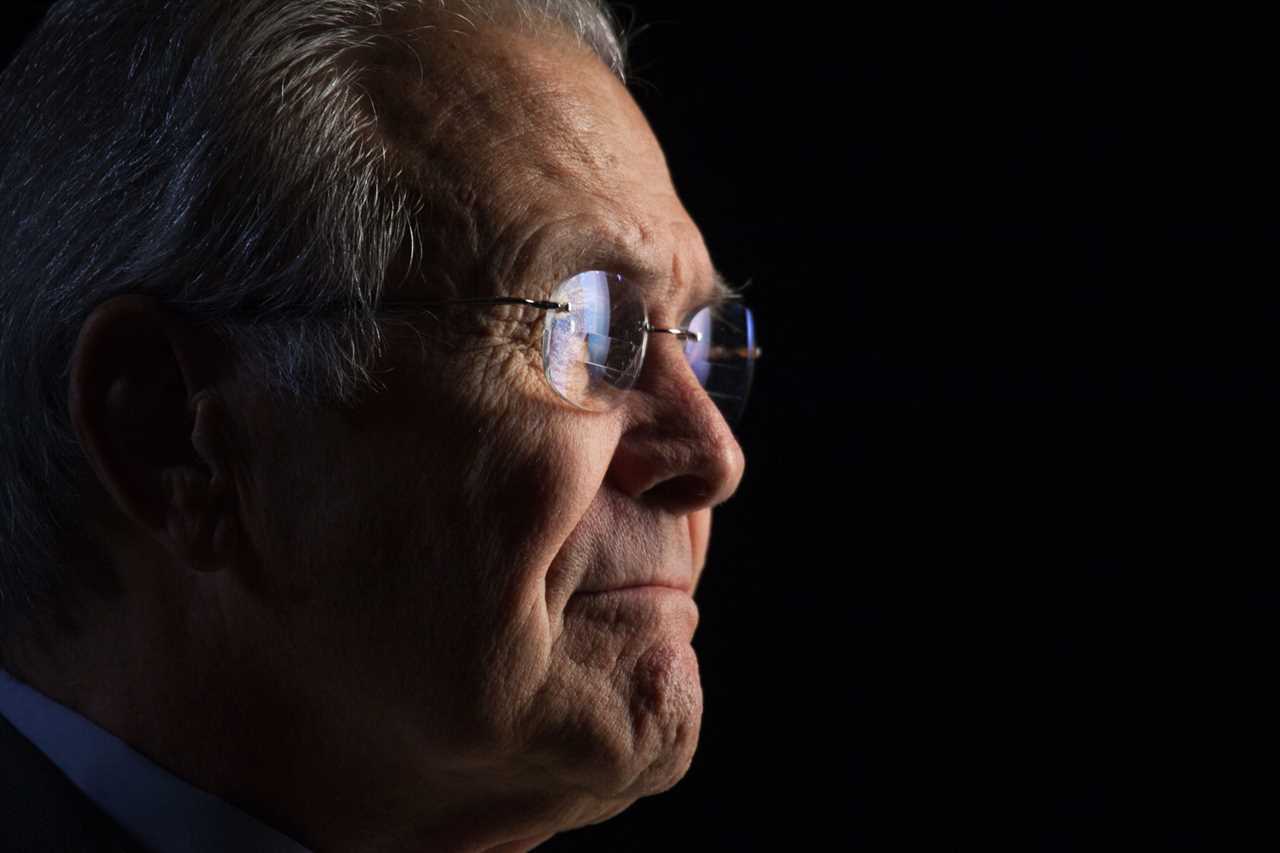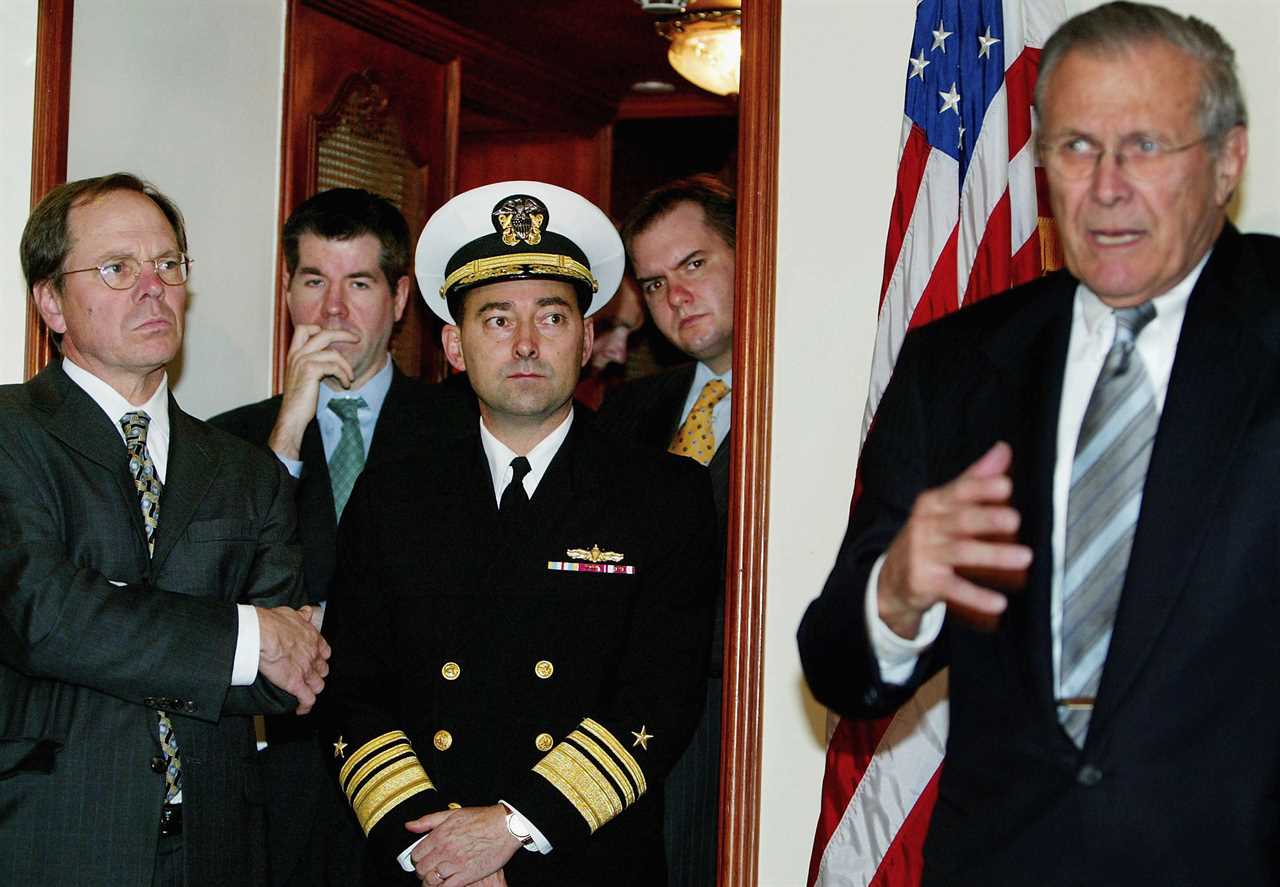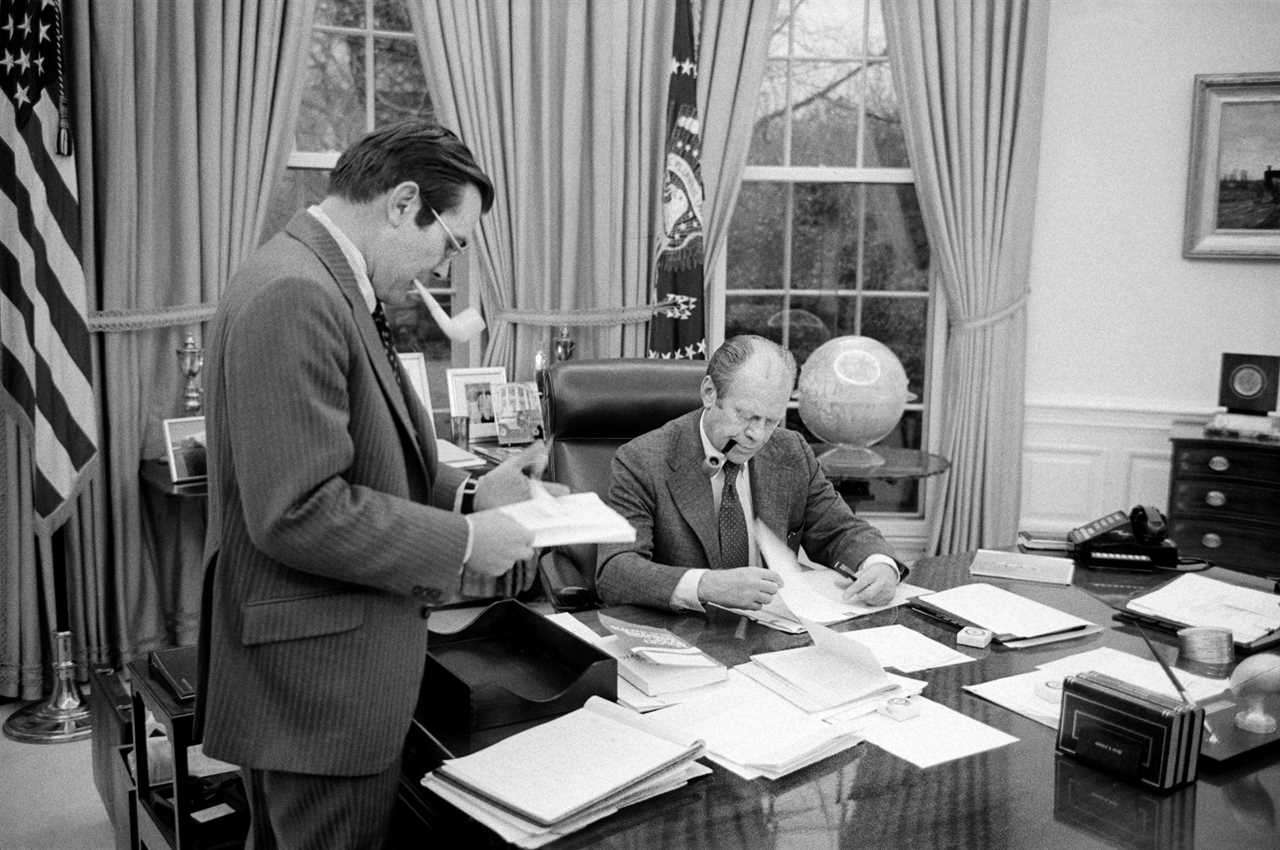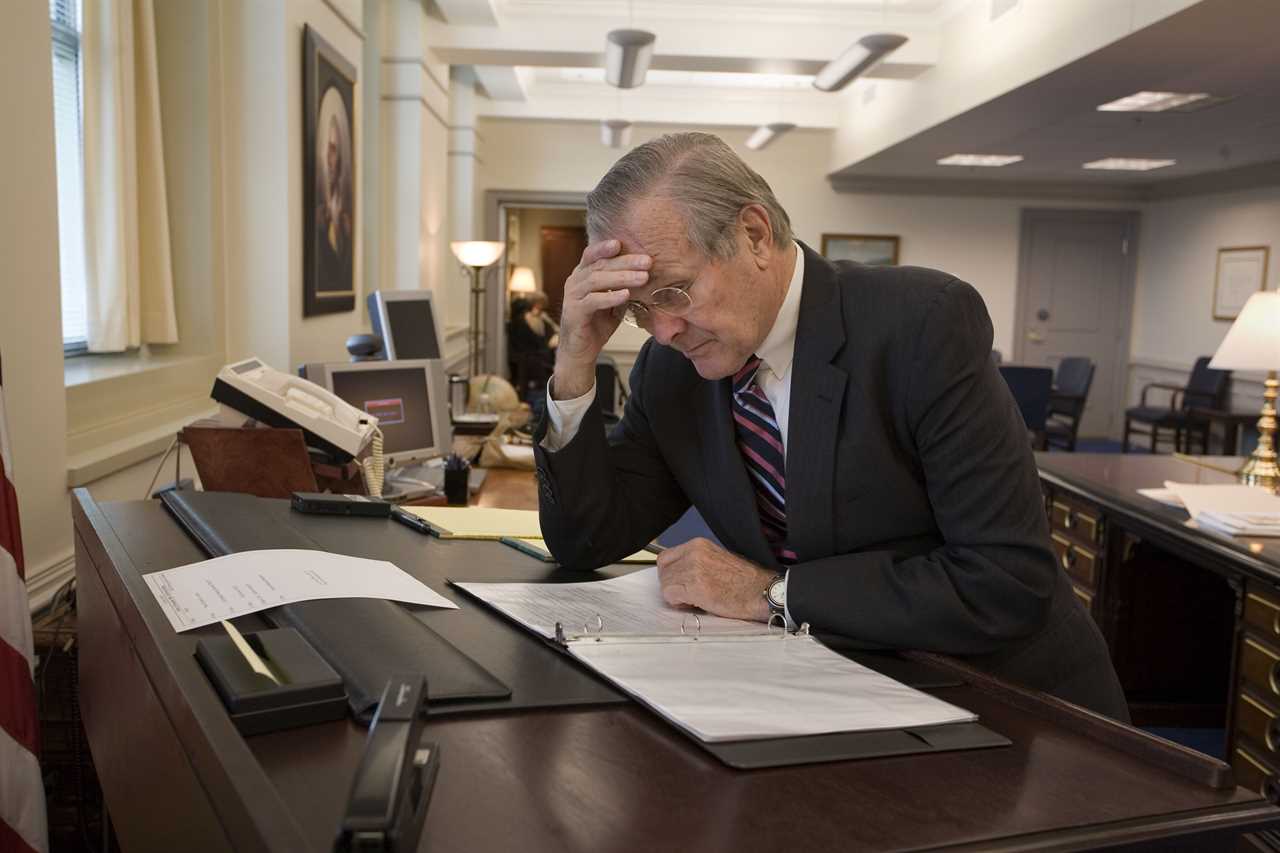
Donald Rumsfeld fired me once.
I had been his chief speechwriter for two years when he was George W. Bush’s secretary of defense and in his retirement we were working together on his memoir. Now that collaboration was ending abruptly. He didn’t enjoy firing me—“stepping back” from each other as he put it—but he delivered the decision in his usual no BS, cards-on-the-table manner.
My offense was a book I’d recently written about my experience in the Bush administration that some of its leaders understandably did not exactly savor. Feeling loyal to his former colleagues, Rumsfeld felt he had no choice but to accede to their requests to let me go. It was an awkward and painful parting. But it was also true to form. He remained faithful to the Bush team, even as some of them turned their backs on him. No one, after all, was exactly jumping to his defense as he became the premier target of a barrage of books and publicity critical of the conduct of the Iraq War, as if every senior official on the national security team hadn’t been closely involved in it. The Iraq War? Oh, that was just Rumsfeld and Cheney’s deal.
Rumsfeld changed his mind a few days later, after getting the advice and support of his stalwart wife and adviser, Joyce. He told me bluntly that he had made a mistake—that he had made a commitment to me and he was sticking by it. If people didn’t like it, well, “what the hell.” He hoped we could still be friends. We were for the rest of his life, which ended Tuesday evening at the age of 88.

I tell this story because it shows that despite Rumsfeld’s portrayal as a canny or ruthless D.C. operative—which was common when he was in government and will be common in his obituaries—ours was far from the typical transactional Washington relationship and he was far from a typical Washington boss.
Over all our 17 years together, I was one of the few fortunate people to have had the chance to see the many sides of Donald Henry Rumsfeld, the youngest and second-oldest defense secretary in our history. I saw the good, the not-as-good and the complicated. As his collaborator on his memoir, I read all the memos and notes he’d ever written going back to his days in Congress in the 1960s. As his chief speechwriter at the Pentagon, I traveled with him to more than 40 countries and learned his rather sticklerish rules of grammar (the word “very” was unnecessary and therefore verboten). As his friend, I talked with him hundreds of times on matters large and small—from how to use a pedometer to whether UFOs were real (“I’m not answering that!”) to his admiration for liberal Adlai Stevenson. In a small way I even helped him become an app developer at the age of 80, adapting an online version of a solitaire card game once played by Winston Churchill.
Many reflecting on the life of Don Rumsfeld over the coming days will focus predictably and, in some ways, understandably on his final years in public service—as an embattled secretary of Defense for George W. Bush during the worst days of the Iraq War, a high-profile moment with grave consequences that unfortunately was his last major act on the public stage. But to see him only through this lens is a disservice to him and to the history he helped to shape for several decades.
Don Rumsfeld was one of the most consequential figures of the last 50 years. A moderate Republican congressman from Illinois, he championed civil rights legislation and a civil style of politics against the extremes of his party. He stood up to LBJ over the lies about the Vietnam War. As an official in the Nixon administration, he tried to make the war on poverty work as director of the Office of Economic Opportunity, which had been established as part of LBJ’s Great Society. A one-time protege of Nixon’s who rebuked the scorched-earth tactics of some senior aides, he was cast in exile to Europe—where, fortuitously, he stayed out of the crossfire as a massive scandal took root.
President Gerald Ford receives credit, deservedly so, for righting the ship of state after Watergate. But it was the man he turned to as his chief of staff, his old friend from Congress Don Rumsfeld, whom he counted on to hold the nuts and bolts of that ship together. Later, as the youngest secretary of defense under Ford, he supported a Reaganite-style military buildup against the Soviets that hastened the end of the Cold War. And it was Don Rumsfeld whom George W. Bush called back to the Pentagon decades later, where he reformed and modernized the defense department while managing two wars and responding to the worst attack on our homeland in our history. He was the administration’s most powerful surrogate when things were going well; its heat shield and shock absorber when things went bad. And he never complained.
Well, except once.
After he resigned as defense secretary, I flew with him and Joyce to a speaking commitment in Kansas. They were in a jovial mood as they often were in each other’s presence. Theirs was a love affair that started in high school and—again, atypical for Washington—endured for more than 70 years. But I wasn’t feeling jovial.

I told him that I resented the media attacks on him by the Bob Woodwards of the world, repeating the set conventional wisdom that the man they had all once praised and admired in the Bush administration’s early halcyon days was now the villain to whom nearly all blame must be ascribed. They blamed him for pushing for the invasion of Iraq in the first place (regime change had been official U.S. policy since the late 1990s, and numerous Democrats and Republicans in Congress called for and voted to authorize Saddam Hussein’s removal. If there’s guilt on that score, it’s a collective one). They blamed him for claiming there were Weapons of Mass Destruction in Iraq (an assertion also made by the Clintons, by foreign leaders with their own intelligence agencies, by foreign policy experts like Joe Biden, to the U.N. by Colin Powell, who personally examined the intelligence himself, and by almost all the punditry who would later pretend they hadn’t said that). They blamed him for simultaneously listening to and then not listening to “his” generals. It was Don Rumsfeld’s curse that he was known as such a strategic thinker and hard charging manager (his Rumsfeld’s Rules of management had become a DC legend); people assumed he was responsible for everything.
To be sure, he was not blameless over the Iraq War and its management. These are arguments that will outlive us all. But it also wasn’t true that it was solely his idea to invade Iraq— constitutionally it wasn’t even his decision—and it certainly wasn’t his plan to stay there forever. Privately he didn’t believe the Middle East could be turned into a democracy almost overnight, as some ideologues in and out of the administration naively did.
Contrary to the image he cultivated as a tough micromanager, he had perhaps to his peril learned from LBJ’s experience in Vietnam to trust and often defer to the generals on the ground in overseeing a war. Those generals, or many of them, told him to stay the course even when a course correction seemed obvious. I heard this myself. Rumsfeld had a habit of forming strong opinions of people. When he liked you, he let you get away with almost anything, and he liked some of the generals running the war in Iraq a lot. They were masters at toppling the regimes in Kabul and Baghdad, which they did brilliantly and quickly, but none of them were—nor was Rumsfeld —cut out for a long drawn out occupation of a foreign land. Neither, it turns out, were the members of the State Department and National Security Council who played major roles in that occupation, or were supposed to. But somehow their leaders largely escaped the condemnation of their friends in the pundit class when WMD weren’t found and Iraq descended into a vicious civil war and democracy did not take root across the Middle East as was promised.
So when this all came to a head as he was on his way out—forced to resign after massive Republican losses in the 2006 midterms partly attributable to the chaos in Iraq—I was pissed as hell. I didn’t think it was fair. And I told him so.
For a moment in the comfortable bubble the three of us shared, the Rumsfelds exchanged looks, and their faces turned raw. They let me in past the cool veneer they’d mastered displaying since the Nixon years. Turned out they weren’t really feeling so jovial after all.
Joyce spoke first. She pointed out that her husband had taken heat for a lot of people over the Iraq War. She didn’t mention any names, but she asked, “Where are they now?” None were coming to his defense or taking any share of the blame. A look of agreement and disappointment gripped her husband’s face. Maybe even sadness. It was the first and only time I’d ever seen his confident demeanor shaken. But then, just as quickly, the tough, resilient Rumsfeld returned and it was on to the business of the moment and the life ahead.
Rumsfeld was one of the last of the old-school public servants, who was kind to people in small, quiet ways; who helped a loved one cope with crippling drug addiction while simultaneously managing a war; who was friends with people ranging from the Kennedys to the Cheneys to Sammy Davis, Jr. and could put politics and policies aside to value them as people. He was an energetic squash player well into his 70s and zipped around the Pentagon, lapping younger and envious aides. He formed a foundation to support entrepreneurs in developing nations.
He had a Boy Scout’s view of right and wrong. He was a stickler for expenses and charges to the taxpayer. He got rid of a personal pastry chef at the Pentagon because he thought it a waste of money. He got reassigned a military aide whose job seemed primarily to be following him around the Department, reasoning that the young man had better things to do and if the secretary of defense couldn’t be safe in the world’s most secure office building then Lord help us all. He bridled at the idea that people didn’t always mean what they said and thought it was an insult to be called “ambitious.” He was aghast when I used the term “flipper” when he told me his dad used to move their family into homes, where they would refurbish, and resell them at a modest profit. He felt the term sounded unseemly.
My most memorable encounter with his ethics was in Mongolia. He had been gifted with a horse, a tradition for visiting officials by the government there. The custom was to present the horse and then retire it to pasture. When I suggested that the Mongolians probably used that same sad old horse on multiple occasions, for various visiting dignitaries, he was alarmed that I had such a “reptilian” view. He couldn’t conceive that anyone would do such a thing. Even after we’d taken off from Ulan Bator on our way home, he remained convinced that he could somehow get that horse sent over to him in America.
He could be harsh, even rude. And for that people feared him, and were afraid to challenge him. I watched him upbraid and embarrass generals and senior aides for seemingly minor errors, such as failing to number pages on a slide presentation. And he was never one to mince words. There were two people in public life for whom he held a lifelong disdain. One was former Vice President Nelson Rockefeller, who he thought an overprivileged bully—Rumsfeld hated both attributes. The other was George H.W. Bush, or “Poppy” as Rumsfeld would refer to him, who epitomized—in his mind at least—the sneering elitism of the American aristocracy. He never forgot the type of people who looked down on the kid from suburban Illinois who got into Princeton on an ROTC scholarship.
With another former colleague, Henry Kissinger, Rumsfeld may have had the most consequential “frenemy” relationship in modern American politics. Both had formidable personalities, and while they could occasionally clash, in later years their rivalry was papered over by age, nostalgia and a mutual charm offensive—based on mutual respect.
He was curmudgeonly at times but in a lovable way—and as I say this as one of the many who knew him and loved him. At my wedding, he got up and danced to ABBA’s “Waterloo”—laughing, smiling, having fun.

Still, Rumsfeld was not in general an emotive person and sometimes seemed bewildered by the frailties of the human condition. When he told me he was resigning from the Pentagon, and he looked at me defeated, tears came to my eyes while he stood passively. Years later I found a note he made to himself that day. It had my name on it and next to it the word “cried” as if he had encountered a bizarre phenomenon.
If he ever betrayed the emotions inside him, it was when he spoke of his family. He had the successful person’s guilt of spending so much time away from his kids as he built his legacy. And he was an old softie whenever he was around his beloved Joyce. When we debated the title of his memoir, which became KNOWN AND UNKNOWN, he expressed disappointment that the title he really wanted was taken by his friends Rose and Milton Friedman: TWO LUCKY PEOPLE.
That’s the way he saw the world—he and Joyce blessed by providence and a wonderful country. From his days as a young aviator in the United States Navy, he spent the majority of his adult life serving that country. When Rumsfeld left government in 2006, he took all the weight of the Bush administration’s failure in Iraq onto his shoulders and bore it into exile. Though he offered some defense of his actions, he also protected colleagues by refusing to reveal in his books some of the more damning information he knew that could have justified some of his decisions. He refused many opportunities to make a McNamara-esque apology for Iraq that would make him look good or to fault President Bush or others for the decisions he took part in. Instead he lived his life—writing bestselling memoirs, spending time out West, helping others where he could, trying to make the world a better place without bitterness or rancor.
And that’s what most every obituary or essay on Rumsfeld you will read in the wake of his death will get wrong. They’ll tell you the story of the ferocious, take-no-prisoners Washington operator whose headstrong tactics got us into an unwinnable war. The great irony is that in the end, this supposedly ruthless political animal didn’t play the game that many others played against him.
----------------------------------------
By: Matt Latimer
Title: The Don Rumsfeld the Obituaries Won’t Write About
Sourced From: www.politico.com/news/magazine/2021/06/30/donald-rumsfeld-what-the-world-got-wrong-497275
Published Date: Wed, 30 Jun 2021 17:18:40 EST






